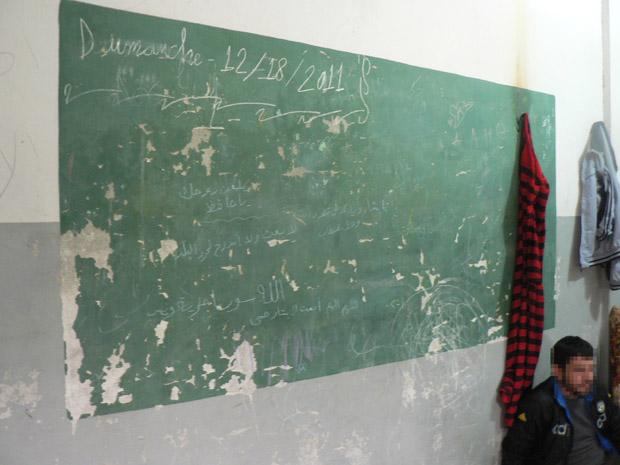Syrian Army defectors find safe haven, community across border in Lebanon
A blackboard at a religious school in Wadi Khaled, Lebanon, contains anti-Assad phrases. The school has been turned into a camp for Syrian refugees.. (Photo by Marine Olivesi.)
An old religious school stands on a hill in the Lebanese village of Wadi Khaled.
Below, red-colored earth marks a smuggling road into Syria. It’s sprinkled with landmines.
Inside the school are blackboards scrawled with slogans denouncing Syrian President Bashar al-Assad. Twenty-one Syrians from one family are now living in the school; they registered with the United Nations Refugee Agency when they arrived three months ago, fleeing the violence in Syria.
But two of them aren’t exactly refugees.
Zein and his brother, who asked not to be identified by their real names, say they were officers in the Syrian Army. They deserted in August, after a raid on their village killed two of their close friends.
Now they carry out operations with the Free Syrian Army, a loose group of armed rebels and army deserters. Zein said he crosses back into Syria, with the help of some Syrian border patrols, to help protect civilians during anti-government protests.
“Before the protests start, we coordinate with activists and plan for safe exits roads. During the protests, we wait and watch,” Zein said. “If the army attacks or surrounds the protesters, we confront them. If they open fire at them, we reply.”
Zein said he just returned from the restive city of Homs; his brother is still there. He said they keep a low profile. None of their Syrian or Lebanese neighbors knows about their activities, and they keep much of their family in the dark as well. They say it’s safer for everyone that way.
Many active Syrian military members are hedging their bets, according to a Free Syrian Army commander who asked to be called “Ahmed.” He said some are even helping insurgents buy weapons.
“Sometimes we buy weapons from the Syrian Army,” said Ahmed, from a safe house in a village at the tip of Lebanon.
Ahmed heads the rebel unit “Dawn of Freedom,” which operates in Homs. Ahmed said he has 350 soldiers under his command.
“Our first goal is to protect civilians. Our position is defending, not attacking,” Ahmed said. “We are completely against attacking the army. We don’t want to put the country in civil war.”
Ahmed said the target is armed thugs, who he said are hired by the Assad government. The Free Syrian Army wants help from the international community, but not military intervention, Ahmed said. What they need, he added, is a no-fly zone and a protected area where civilians and defectors can find refuge.
Without a rebel stronghold, defectors have to operate under the radar inside Syria. Those now in northern Lebanon say they’re only here to see their families or because they’ve been wounded.
In the Lebanese city of Tripoli, 23-year-old Marouan said he only goes out of his safe house for physical therapy. In October, he was in his last month of military service when his Syrian Army unit stormed a village at the border. He said he was ordered to open fire at any civilians trying to cross over to Lebanon.
When he was told to kill or be killed, he ran away. He was shot in the arm and shoulder as he tried to cross the border, he said.
Marouan made it into Lebanon and underwent surgery at a local hospital. Then the Red Cross moved him to Tripoli. Marouan said that he and his friends in the Army never talked about defecting – they were afraid to talk.
“We were being watched all the time, even at night,” Marouan said.
Marouan said that tight control is what prevents more soldiers from leaving the Army. He thinks more would defect if they had a safe place to go — and he thinks that could make the Assad regime collapse.
If it didn’t, Marouan said, that would be the right time for a full-on offensive. For now, defectors say the Free Syrian Army has neither the manpower nor the firepower for such grand plans.
